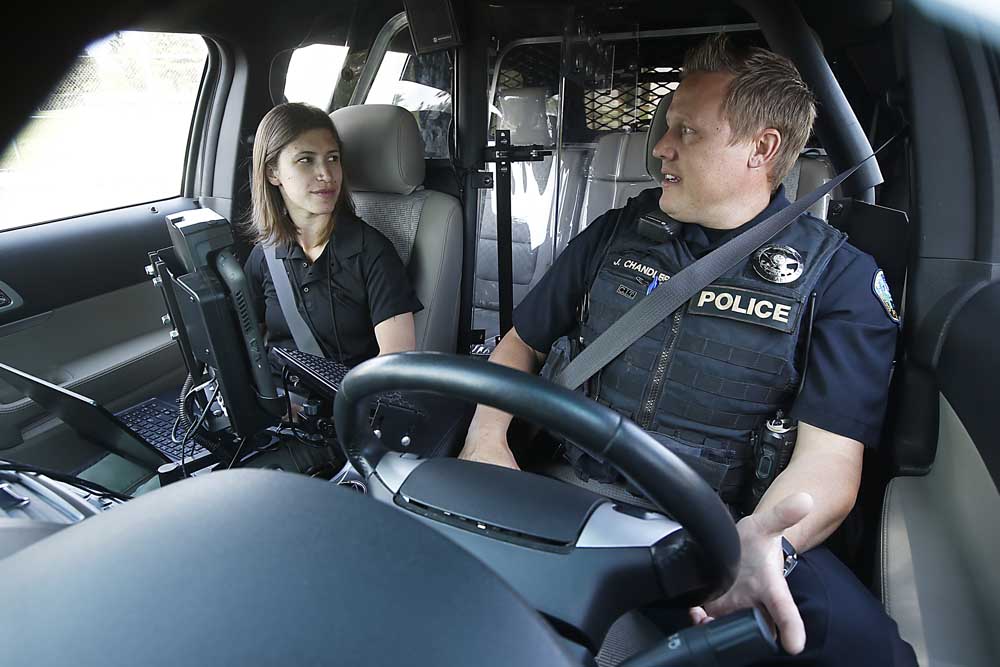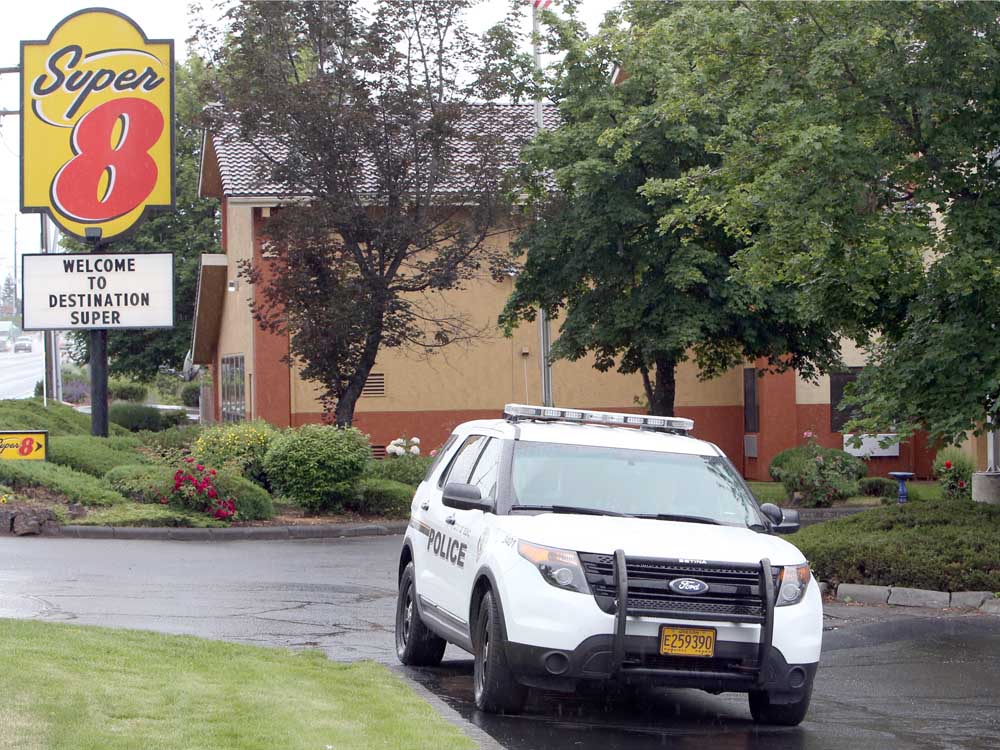Deschutes County a leader in use of Oregon’s ‘red-flag’ gun confiscation law
Published 5:15 pm Wednesday, July 6, 2022

- Abby Levin, a licensed professional counselor with the Deschutes County Health Department, talks with Bend Police officer Jake Chandler while working a shift together in 2019, part of a pilot project pairing police officers with mental health workers.
Americans are responding to an ongoing barrage of mass shootings with increased talk of laws to keep firearms out of the wrong hands.
Last month, President Joe Biden signed a bipartisan gun safety bill containing funding for states to create crisis intervention programs that allow police to take weapons from people thought to represent a danger to themselves or others.
Oregon is one of 19 states with a “red flag” law already on the books. In 2017, legislators approved a bill creating extreme risk protection orders, a legal tool similar to restraining orders but available to police, as well as family members and roommates.
Since early 2020, Deschutes County has been a state leader in extreme risk protection order petitions, neck-and-neck with more populous Portland-area counties, though a shortage of officers and shortcomings with the law threaten to blunt the orders’ effectiveness.
Under the extreme risk protection order statute, a police officer who encounters a person who concerns them can submit paperwork at the courthouse and go before a judge with the subject not present. The judge may ask questions and approve or deny the protection order request. If approved, the subject is served with the order and given 24 hours to turn over his or her firearms.
The affected gun owner may appeal and a hearing to determine whether to make the order “permanent” must be held within 21 days. The affected person is allowed to attend this hearing and plead his or her case.
A 2018 analysis of court records by The Oregonian found few affected gun owners challenged the initial decisions.
Extreme risk protection orders are similar to peace officer holds, which are psychiatric holds at health care facilities, but have a lower bar for approval.
Deschutes County District Attorney John Hummel said judges often throw out petitions for peace officer holds because the threat is too vague.
“ERPOs kind of fill that gap,” Hummel said, using the initials for extreme risk protection order. “They ask, is it reasonable to believe that this person might be violent?”
“I’d like to see Deschutes County use ERPOs as much as possible.”
Mental health crisis
Police often engage with people experiencing a mental health crisis, a role they’re not typically trained for. And as public consciousness around mental health has risen, spurred by the pandemic and police shootings, some forces have adapted. Mental health workers now ride alongside officers on crisis calls. But the arrangement is far from the norm, and it’s still far from optimal, say mental health officials.
“We’d like to take the law enforcement out of it as much as possible,” said Holly Harris, the county’s program director for crisis services.
Nonprofit programs like Lane County’s CAHOOTS mobile crisis intervention program take police out of the equation in responding to these calls, but local leaders have said a CAHOOTS-like approach has not proven workable here.
In 2015, the Bend Police Department formed a unit of officers with training in mental health. Called the crisis response team, it responds to the hundreds of 911 calls each year that have a “suspected mental-health component,” like a person screaming downtown or walking in traffic.
Four years after the team was formed, the county received a grant to embed a mental-health worker in the unit.
The combination of the three-officer crisis response team and the mental health co-responder is credited with diverting people in crisis from jail or the emergency department of the hospital. It’s now also recognized for making Deschutes County a state leader in extreme risk protection order requests since 2020.
That year, 95 extreme risk protection orders were filed by law enforcement in Oregon. Nineteen were in Deschutes County. Of the 19, 16 were initiated by Bend Police, two by Redmond Police Department and one by the Deschutes County Sheriff’s Office.
In 2021, 24 extreme risk protection orders were filed by law enforcement in Deschutes County, 15 of which were filed by Bend Police. Two were initiated by Redmond Police and three by the sheriff’s office. The remainder were filed by family or other household members.
The difference in extreme risk protection order filings by Bend Police and the comparably sized sheriff’s office is thought to be largely the product of Bend Police having a dedicated mental health unit. The sheriff’s office declined to make a staff member available for an interview. In an email, sheriff’s Lt. William Bailey said deputies are trained on extreme risk protection orders and should be aware the tool is available to them. Bailey said the sheriff’s office has a guide to filing for an extreme risk protection order up on its website. The sheriff’s office also offers gun storage to residents who cannot safely store their guns.
Bailey said more coordination with deputies and the county’s Mobile Crisis Assessment Team, which does not respond to emergency calls, could possibly lead to more extreme risk protection orders filed by deputies.
City police are naturally going to have more contact with people experiencing mental illness than county deputies, according to Harris. There’s less space, and cities like Bend have lots of tourists and other potential witnesses to call 911 when someone is in crisis.
Oregon’s protection order statute has several shortcomings, according to the law’s supporters. For one, there’s a 24-hour gap between when a person is served with an order and when guns must be surrendered, and, Harris notes, a lot can happen in 24 hours. The law also doesn’t account for airsoft or replica pistols that look real and could easily get a person interacting with police killed, said Harris.
Gaps in staff, training
So far in 2022, six extreme risk protection orders have been filed, five of which were initiated by Bend Police.
The majority of Bend Police’s requests were written by one officer: Jake Chandler. While serving on the crisis response team, Chandler refrained from using the word “crazy” and boasted of making only one arrest in a calendar year.
Chandler now works as the investigator for the Deschutes County District Attorney’s office. This month, he’ll start conducting extreme risk protection order trainings at local police agencies.
Chandler said some of the disparity in requests could be related to law enforcement’s relationship with gun rights advocacy. At least 37 sheriffs have declared their counties “sanctuaries” from red-flag laws since 2019, according to a recent analysis by Kaiser Health News. But Chandler said it’s mostly that officers simply don’t know about the program.
Staff vacancies have also meant the Bend Police crisis response team has been cut from three officers to one, Chris Smelser, who’s ridden alongside county mental health counselor Hailey Clark for the past several months.
The Deschutes County Sheriff’s Office last week had four vacancies in sworn positions and 11 correction deputy vacancies. The department is contending with around 10 vacancies for sworn officers.
The county’s first mental-health embed was Abby Levin, who rode many shifts alongside Chandler. She now works at the place where many people in crisis end up, at least temporarily: the Deschutes County Stabilization Center.
“Ultimately, it’s up to the officer to apply for the ERPO, and it’s all at their discretion,” Levin said. “But I think that that collaboration and coordination between us really helped tease out those highest-risk situations.”
Both Levin and Chandler say they’re sure extreme risk protection orders have saved lives in Deschutes County.
One day while working on the crisis response team, Chandler got a text from a man he knew from several contacts. He’d been having trouble in his life and told Chandler he didn’t trust himself around his guns. He asked if the officer would file an extreme risk protection order against him, though he used the name of Florida’s red-flag law, the Baker Act.
“He recognized that he was in a place where he did not feel safe, and he thought that this would be a good tool for him,” Levin said.
When the initial hearing was held, the man was in attendance. He was called as a witness for the state and he testified in favor of the order.






